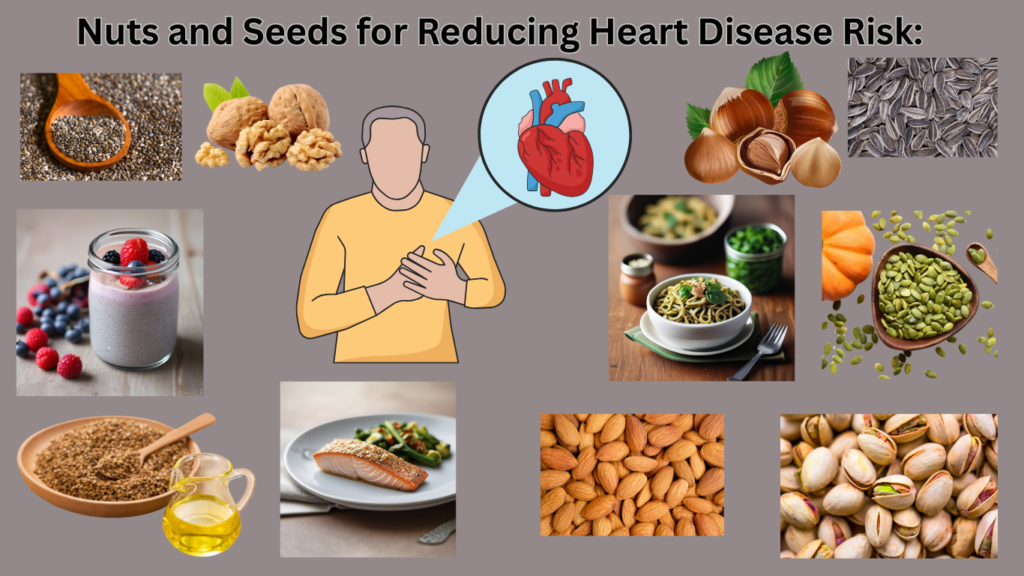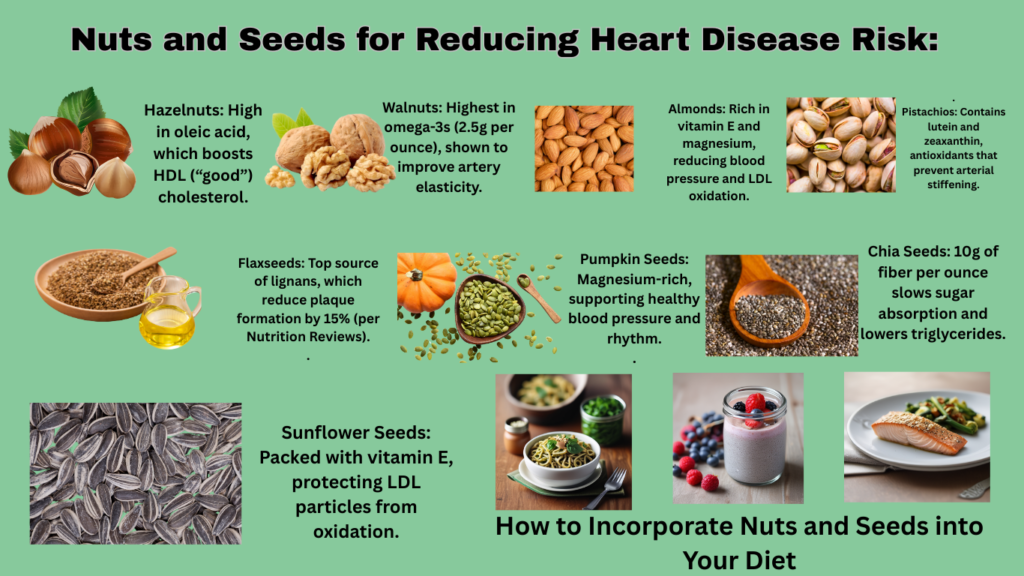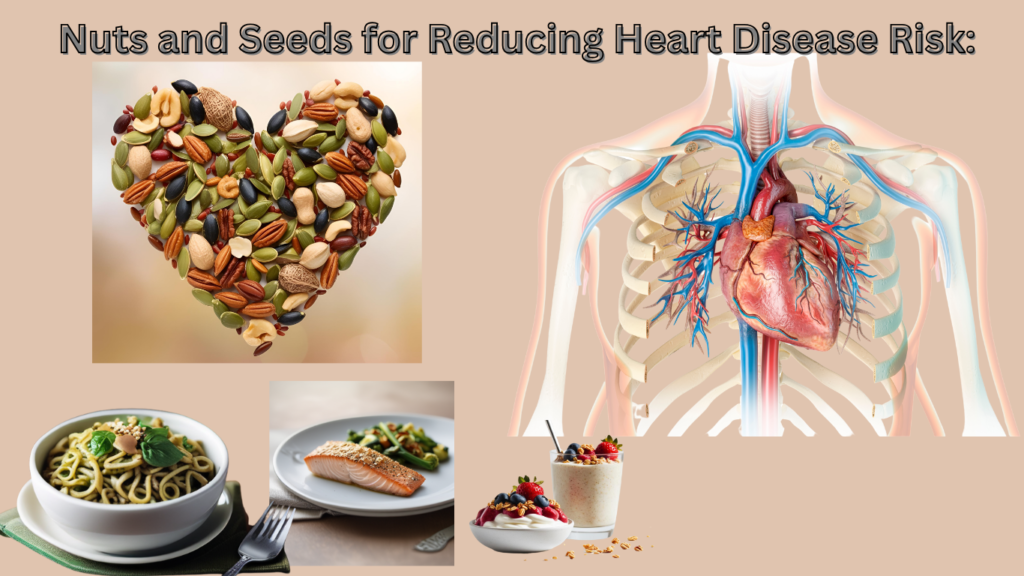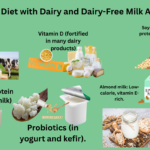
Nuts and Seeds for Reducing Heart Disease Risk: A Nutritional Powerhouse
Heart disease remains the leading cause of death globally, but simple dietary changes—like incorporating nuts and seeds—can significantly lower risks. Packed with heart-healthy fats, fiber, and antioxidants, nuts and seeds are proven to reduce cholesterol, improve blood vessel function, and combat inflammation. This guide dives into the science of how nuts and seeds for lowering heart disease risk can transform cardiovascular health, featuring top choices, portion strategies, and answers to common questions. Nuts and Seeds for Reducing Heart Disease Risk:
1. Why Nuts and Seeds Are Heart-Protective Superfoods
Nuts (e.g., almonds, walnuts) and seeds (e.g., flaxseeds, chia) are nutrient-dense foods rich in:
- Monounsaturated and Polyunsaturated Fats: Lower LDL (“bad”) cholesterol and triglycerides.
- Omega-3 Fatty Acids: Reduce inflammation and prevent arterial plaque buildup (especially in walnuts and flaxseeds).
- Fiber: Binds to cholesterol in the gut, aiding its excretion.
- Plant Sterols: Block cholesterol absorption.
- Antioxidants (Vitamin E, Polyphenols): Protect blood vessels from oxidative damage.
A 2021 review in Circulation found that eating 30g of nuts daily reduces heart disease risk by 30% and lowers LDL cholesterol by 7–10%.
2. Top 8 Nuts and Seeds for Heart Health
Nuts and Seeds for Reducing Heart Disease Risk:
- Walnuts: Highest in omega-3s (2.5g per ounce), shown to improve artery elasticity.
- Almonds: Rich in vitamin E and magnesium, reducing blood pressure and LDL oxidation.
- Pistachios: Contains lutein and zeaxanthin, antioxidants that prevent arterial stiffening.
- Hazelnuts: High in oleic acid, which boosts HDL (“good”) cholesterol.
Seeds:
- Flaxseeds: Top source of lignans, which reduce plaque formation by 15% (per Nutrition Reviews).
- Chia Seeds: 10g of fiber per ounce slows sugar absorption and lowers triglycerides.
- Pumpkin Seeds: Magnesium-rich, supporting healthy blood pressure and rhythm.
- Sunflower Seeds: Packed with vitamin E, protecting LDL particles from oxidation.
3. How Nuts and Seeds Protect the Heart: 6 Mechanisms
3.1. Lower LDL Cholesterol
The unsaturated fats in nuts and seeds replace saturated fats, reducing LDL levels. A 2020 study in JAMA found that a daily handful of almonds decreased LDL by 11% in six weeks.
3.2. Reduce Inflammation
Omega-3s in walnuts and flaxseeds suppress pro-inflammatory cytokines like CRP, a marker linked to heart attacks.
3.3. Improve Endothelial Function
Antioxidants in nuts and seeds enhance nitric oxide production, relaxing blood vessels and improving circulation. Nuts and Seeds for Reducing Heart Disease Risk:
3.4. Regulate Blood Pressure
Magnesium and potassium in pumpkin seeds and almonds help dilate arteries, lowering systolic blood pressure by 4–5 mmHg.
3.5. Prevent Blood Clots
Vitamin E in sunflower seeds and hazelnuts inhibits platelet aggregation, reducing clot formation risk.
3.6. Stabilize Blood Sugar
Fiber and healthy fats slow glucose absorption, preventing insulin spikes that damage blood vessels over time.
4. How to Incorporate Nuts and Seeds into Your Diet

4.1. Daily Portions
- Nuts: 1 ounce (a small handful) daily—about 23 almonds or 14 walnut halves.
- Seeds: 1–2 tablespoons daily (e.g., chia in oatmeal, flaxseeds in smoothies).
4.2. Smart Pairings
- Sprinkle chia seeds on yogurt or salads.
- Blend walnuts into pesto or grind flaxseeds into baked goods.
- Avoid salted or sugar-coated varieties to minimize sodium and added sugars.
4.3. Recipes for Heart Health
- Almond-Crusted Salmon: Combines omega-3s from fish and nuts.
- Chia Pudding: Mix chia seeds with almond milk and berries.
- Walnut-Pesto Whole Grain Pasta: Adds fiber and antioxidants.
5. Q&A: Nuts and Seeds for Heart Health Demystified
Q1: How many nuts and seeds should I eat daily to reduce heart disease risk?
Aim for 1 ounce of nuts and 1–2 tablespoons of seeds daily. Studies show this quantity maximizes benefits without excess calories.
Q2: Are roasted nuts less healthy than raw nuts?
Lightly roasted nuts retain most nutrients, but avoid those cooked in unhealthy oils or coated with salt/sugar.
Q3: Can nuts and seeds replace statins for cholesterol control?
No—they complement medications but aren’t substitutes. Always consult your doctor before making changes to treatment plans.
Q4: Which is better for the heart: flaxseeds or chia seeds?
Both are excellent! Flaxseeds have more lignans, while chia seeds offer higher fiber. Rotate them for varied benefits.
Q5: Do nuts cause weight gain despite heart benefits?
Nuts are calorie-dense, but their fiber and protein promote satiety. Studies link moderate nut consumption to lower body weight over time.
6. Scientific Evidence: Nuts, Seeds, and Cardiovascular Outcomes
- The PREDIMED Trial found a Mediterranean diet with 30g of nuts daily reduced heart attack risk by 30% in high-risk patients.
- A 2022 meta-analysis in The American Journal of Clinical Nutrition linked seed consumption to a 12% lower risk of coronary artery disease.
- Research in Hypertension showed daily flaxseed intake lowered systolic blood pressure by 10–15 mmHg in hypertensive patients.
7. Beyond Cholesterol: Additional Benefits of Nuts and Seeds
- Brain Health: Walnuts and chia seeds support cognitive function via omega-3s.
- Gut Health: Fiber in nuts/seeds feeds beneficial gut bacteria linked to reduced inflammation.
- Longevity: A New England Journal of Medicine study tied nut consumption to a 20% lower mortality rate.
8. Potential Risks and Considerations
- Allergies: Tree nuts (e.g., almonds, walnuts) are common allergens. Opt for seeds if allergic.
- Calorie Awareness: Stick to portions to avoid overconsumption.
- Phytic Acid: Soak or sprout nuts/seeds to enhance mineral absorption.
9. The Verdict: A Heart-Healthy Habit Worth Adopting
Nuts and seeds are a simple, tasty, and research-backed strategy for reducing heart disease risk. They offer a natural way to protect your heart by lowering cholesterol, fighting inflammation, and improving vascular health. Pair them with a balanced diet, regular exercise, and stress management for optimal results.




Pingback: Comprehensive Analysis of Kale's Antioxidant Properties - mysproutapp.com